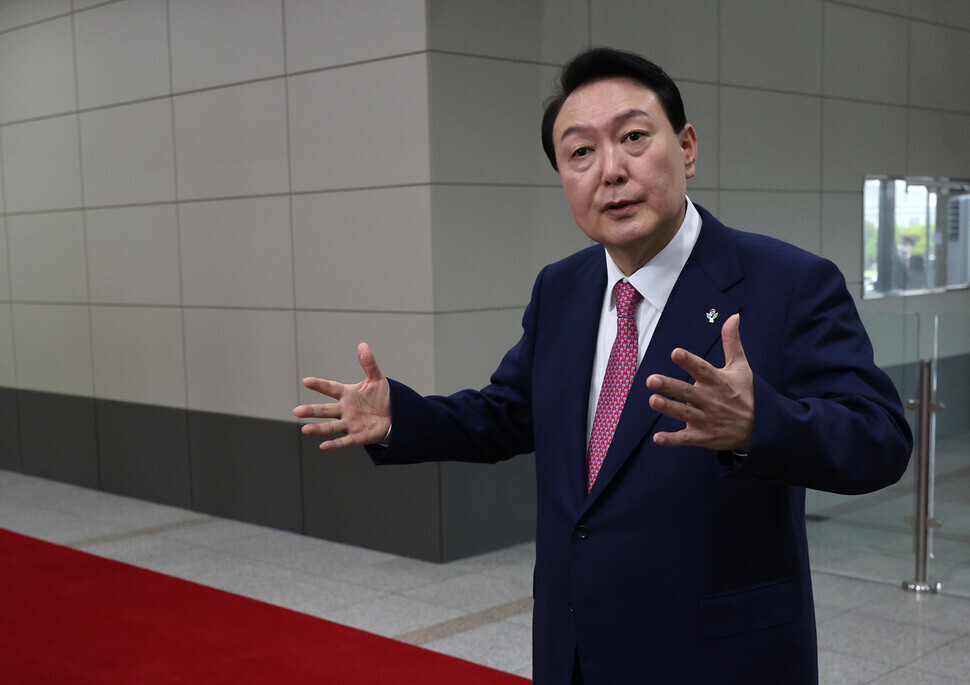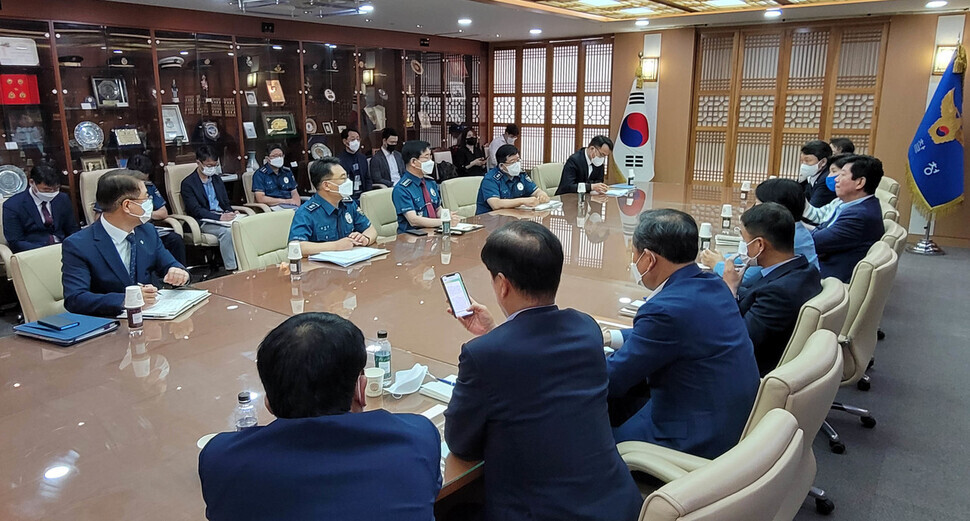hankyoreh
Links to other country sites 다른 나라 사이트 링크
Why Yoon is fuming over confusion about top-level police appointments

President Yoon Suk-yeol has dubbed the recent incident in which the recent personnel appointments for police senior superintendent general positions were reversed in a matter of two hours a “serious breach of the nation’s foundation,” stirring controversy with his scathing comments directed at the police.
Even though retracing the process by which the personnel appointment was reversed indicates that it could have been an outcome of interference by heavyweights in the ruling camp, such as officials within the presidential office or figures in the People Power Party, Yoon is attempting to write off what happened as the result of the police’s dereliction of duty.
Many within the police believe Yoon is disciplining the organization for opposing his intent to deploy his close associate — Minister of the Interior and Safety Lee Sang-min — to establish a “police bureau” akin to the Criminal Affairs Bureau that oversees prosecutors within the Ministry of Justice.
The mood among police has been sour since Yoon’s criticism of the agency Thursday morning, when the president made clear that he believed his power of appointment was disregarded by stating that “a personnel appointment that hadn’t even been approved by the president was leaked” and that “the police simply went ahead and assigned an appointee it had itself recommended to the Ministry of the Interior and Safety.”
Countering Yoon’s claim that he was passed over, National Police Agency Commissioner General Kim Chang-yong explained that “a primary proposal that was different from the personnel appointment proposal submitted [by us] was handed down [to us]” while meeting with Democratic Party lawmakers looking into the matter — essentially refuting the president’s claim in an unprecedented move contradicting the nation’s leader.
After talking with Kim, Democratic Party lawmaker Back Hye-ryun said, “A primary proposal different from the personnel appointment proposal submitted by the National Police Agency was handed down [by the Ministry of the Interior and Safety], which was altered once more afterward. [Kim said] the primary proposal handed down [to the police] was definitely pre-arranged with the Interior and Safety Ministry. What happened during the two hours is what actually needs to be cleared up.”

In other words, the personnel appointment proposal could have been altered by the ministry or the presidential office. As a matter of fact, some say that Kim Hak-gwan, the National Police Agency’s director general in charge of planning and coordination who is among the seven whose appointments were rescinded within a matter of two hours, may have been pushed out of a major appointment to serve as the Seoul Metropolitan Police Agency’s deputy chief of local police agencies because he previously served under the Blue House’s secretary to the president for state affairs monitoring during the Moon Jae-in administration.
Members of the police say they are baffled by Yoon’s remarks, retorting that it would be nonsensical for the agency to pass over the president and announce its new personnel appointments on its own. Some even say that rushing the personnel appointment process so that individuals departing from their posts wouldn’t even be able to say their farewells before going, only to overturn the appointment within two hours, can be interpreted as the Yoon administration’s way of instructing the police on how to conduct themselves in their service for the next five years.
Others also question why the president himself is designating the incident as one of “a serious breach of the nation’s foundation by the police” when it can simply be explained as an administrative mistake.
A high-ranking police official said, “How do you explain the fact that [appointees] were ordered to start at their new posts by 9 am after [the president] authorized the personnel appointment at 10 pm the day before? [Yoon’s statement] cannot be understood as anything but a command for the police to remain silent.”
Regarding this, Yoon said that newly establishing a so-called police bureau would not be a problem, “as the prosecution service also has a Criminal Affairs Bureau under the Ministry of Justice.” The establishment of a police bureau is considered a way through which the administration could exert greater authority over the police. Yoon’s logic is that since the post of senior secretary to the president for civil affairs, which previously oversaw the police, has been abolished, “it’s natural that the Ministry of the Interior and Safety, which handles public security and police affairs, start commanding and controlling [the police].”
However, the police and the Ministry of the Interior and Safety are two disparate organizations founded on distinct historical contexts, legal regulations, and organizational structures. First, the Interior and Safety Ministry is not in charge of public security and police affairs according to the Government Organization Act. This is because the National Security Headquarters of the Ministry of Home Affairs (currently the Ministry of Interior and Safety), which wielded enormous power during military dictatorships, was abolished following legal reforms after Korea’s democratization.
On the other hand, ever since the original legislation of the Government Organization Act in 1948, the minister of justice has consistently been designated as the supervisor of prosecutorial affairs. As prosecutors are guaranteed their status as firmly as judges are and have the authority to investigate and indict, the justice minister’s authority over prosecutors operates as the minimum check on them, allowing for civil control over the prosecution service.
Some also say that the Yoon administration’s conflation of the Justice Ministry, whose ministers and high-ranking officials tend to be former and current prosecutors, and the Interior and Safety Ministry, whose officials are generally regular civil servants, points to the limitations of a president who, as a former prosecutor general, is capable of seeing things only through the lens of the prosecution service.
Han Sang-hee, a professor of law at Konkuk University, commented, “What authorities a state institution has should be decided by law, and deviations from what the law states and means should be made passively. Authority over public security is granted to the National Police Agency, and there’s no room to interpret that the Minister of the Interior and Safety can exercise [such an authority].”
By Park Su-ji, staff reporter; Seo Hye-mi, staff reporter
Please direct questions or comments to [english@hani.co.kr]

Editorial・opinion
![[Editorial] Does Yoon think the Korean public is wrong? [Editorial] Does Yoon think the Korean public is wrong?](https://flexible.img.hani.co.kr/flexible/normal/500/300/imgdb/original/2024/0417/8517133419684774.jpg) [Editorial] Does Yoon think the Korean public is wrong?
[Editorial] Does Yoon think the Korean public is wrong?![[Editorial] As it bolsters its alliance with US, Japan must be accountable for past [Editorial] As it bolsters its alliance with US, Japan must be accountable for past](https://flexible.img.hani.co.kr/flexible/normal/500/300/imgdb/original/2024/0417/6817133413968321.jpg) [Editorial] As it bolsters its alliance with US, Japan must be accountable for past
[Editorial] As it bolsters its alliance with US, Japan must be accountable for past- [Guest essay] Amending the Constitution is Yoon’s key to leaving office in public’s good graces
- [Editorial] 10 years on, lessons of Sewol tragedy must never be forgotten
- [Column] A death blow to Korea’s prosecutor politics
- [Correspondent’s column] The US and the end of Japanese pacifism
- [Guest essay] How Korea turned its trainee doctors into monsters
- [Guest essay] As someone who helped forge Seoul-Moscow ties, their status today troubles me
- [Editorial] Koreans sent a loud and clear message to Yoon
- [Column] In Korea’s midterm elections, it’s time for accountability
Most viewed articles
- 1[Column] The clock is ticking for Korea’s first lady
- 2[News analysis] After elections, prosecutorial reform will likely make legislative agenda
- 3Samsung barricades office as unionized workers strike for better conditions
- 4[Editorial] Does Yoon think the Korean public is wrong?
- 5‘Right direction’: After judgment day from voters, Yoon shrugs off calls for change
- 6Korea, Japan jointly vow response to FX volatility as currencies tumble
- 7[Editorial] When the choice is kids or career, Korea will never overcome birth rate woes
- 8Why Israel isn’t hitting Iran with immediate retaliation
- 9S. Korea, Japan reaffirm commitment to strengthening trilateral ties with US
- 10Japan officially says compensation of Korean forced laborers isn’t its responsibility